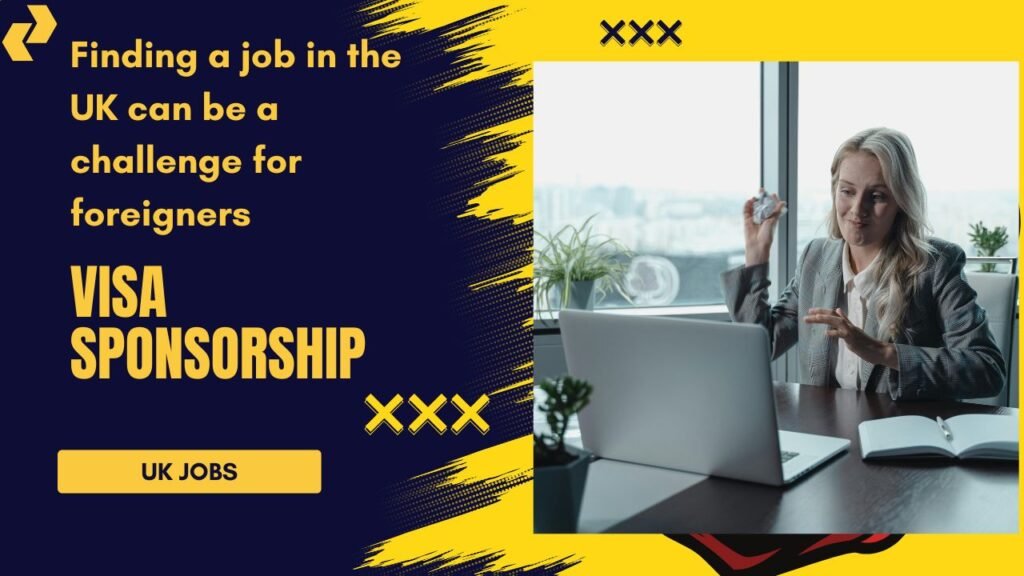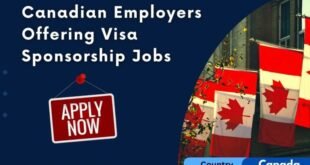Finding a job in the UK as a foreigner can be a challenge. Many people seek opportunities that offer visa sponsorship.
This type of job allows individuals to work legally in the UK while contributing to the economy. The demand for skilled workers in the UK continues to grow. Companies often look for international talent to fill gaps in their workforce.
Visa sponsorship jobs provide a pathway for foreigners to build their careers in a new country. These positions can be found in various sectors, including healthcare, engineering, and IT. Understanding the requirements and processes for obtaining a visa is essential for success. This guide will explore the options available for foreigners seeking jobs in the UK with visa sponsorship.
You May Also Like:

VISA Sponsorship Basics
Finding a job in the UK can be a challenge for foreigners. Understanding visa sponsorship is essential. It allows companies to hire non-UK residents. This guide explains the basics of visa sponsorship. It helps you navigate job opportunities in the UK.
What is VISA Sponsorship?
Visa sponsorship is a process where a UK employer supports a foreign worker to live and work in the UK. The employer must be registered with the Home Office. They must have a valid sponsor license. This license allows them to sponsor foreign workers.
Here are key points about visa sponsorship:
- The employer must prove the need for a foreign worker.
- The job must meet specific skill and salary requirements.
- The worker must apply for a visa based on the sponsorship.
The visa sponsorship process involves several steps:
- The employer offers a job to the foreign worker.
- The employer issues a Certificate of Sponsorship (CoS).
- The worker applies for a visa using the CoS.
- The worker must wait for visa approval.
Here is a simple table showing the roles in the sponsorship process:
| Role | Responsibility |
|---|---|
| Employer | Provide job offer and issue CoS |
| Worker | Apply for a visa with the CoS |
| Home Office | Approve or deny the visa application |
Types of Sponsorship VISAS
There are different types of sponsorship visas in the UK. Each visa serves a specific purpose. Here are the main types:
- Skilled Worker Visa: For skilled jobs with a minimum salary.
- Health and Care Visa: For health professionals.
- Temporary Worker Visa: For short-term employment.
- Intra-company Transfer Visa: For employees moving within a company.
Each visa has unique eligibility requirements. Here is a brief comparison of these visas:
| Visa Type | Eligibility | Duration |
|---|---|---|
| Skilled Worker Visa | Job offer with specific skills | Up to 5 years |
| Health and Care Visa | Health professionals with a job offer | Up to 5 years |
| Temporary Worker Visa | Short-term job offer | Up to 2 years |
| Intra-company Transfer Visa | Transfer within the same company | Up to 5 years |
Understanding these types helps in choosing the right visa. Each type has its requirements and benefits.
Popular Job Sectors
Many foreigners seek jobs in the UK with visa sponsorship. Various sectors are hiring talent from around the world. Understanding these popular job sectors helps job seekers find the right opportunities. The healthcare and tech industries are among the most promising sectors for foreign workers.
Healthcare Opportunities
The UK healthcare sector is always in need of skilled workers. This demand creates many job openings for foreigners. Nurses, doctors, and care assistants are in high demand. The National Health Service (NHS) is a major employer.
Key reasons to consider healthcare jobs:
- High demand for skilled professionals
- Competitive salaries
- Visa sponsorship available
Popular healthcare roles include:
| Job Title | Average Salary (per year) |
|---|---|
| Nurse | £25,000 – £35,000 |
| General Practitioner (GP) | £60,000 – £90,000 |
| Care Assistant | £18,000 – £24,000 |
Many healthcare jobs offer training. This can help you adapt to the UK system. Language skills are important but not always a barrier. Some employers provide support for language training.
Tech Industry Roles
The tech industry is thriving in the UK. Companies are eager to hire foreign talent. Positions in software development, data analysis, and cybersecurity are growing rapidly. The rise of remote work has further increased demand.
Reasons to explore tech roles:
- High salary potential
- Flexibility in work arrangements
- Visa sponsorship options available
Common tech jobs include:
| Job Title | Average Salary (per year) |
|---|---|
| Software Developer | £30,000 – £60,000 |
| Data Analyst | £25,000 – £45,000 |
| Cybersecurity Specialist | £40,000 – £70,000 |
The tech industry values skills over location. Many companies are open to remote work. This flexibility can make job searching easier for foreigners.
Finding Sponsored Jobs
Finding a job in the UK with visa sponsorship can be a challenge for foreigners. It requires the right approach and tools. Many companies are open to hiring international talent. The key is knowing where to look and how to connect. This section will explore effective ways to find sponsored jobs in the UK.
Job Boards and Websites
Using job boards and websites is one of the best ways to find sponsored jobs. Many online platforms list job openings that offer visa sponsorship. Here are some popular job boards:
- Indeed: A vast collection of job listings from various sectors.
- LinkedIn: A professional network that allows job searching and networking.
- Glassdoor: Provides job listings along with company reviews.
- Reed: Focuses on UK-based jobs with various filters.
Some websites specialize in helping foreigners find jobs with visa sponsorship. Consider these:
| Website | Description |
|---|---|
| Work in the UK | Lists jobs that specifically offer visa sponsorship. |
| Visa Sponsorship Jobs | Dedicated to jobs that provide visa sponsorship options. |
| Jobserve | Includes a section for international job seekers. |
Set up job alerts on these platforms. This way, you receive notifications for new postings that match your skills. Search using keywords like “visa sponsorship” to find the right opportunities.
Networking Tips
Networking is crucial in the job search process. Building connections can lead to job opportunities. Here are some effective networking tips:
- Join professional groups: Participate in industry-related groups on LinkedIn.
- Attend job fairs: Look for job fairs that focus on international recruitment.
- Connect with alumni: Reach out to former classmates who work in the UK.
- Utilize social media: Share your job search on platforms like Facebook and Twitter.
Personalize your messages when reaching out. Be clear about your skills and your goal to find a sponsored job. Follow up after initial meetings. This helps keep you in the minds of your contacts.
Consider informational interviews. These are informal chats that can lead to job referrals. Ask questions about their experience and advice. This builds rapport and trust.
Application Process
Finding a job in the UK with visa sponsorship can be a rewarding experience. The application process is crucial. It involves several steps, from preparing your CV to acing the interview. Understanding this process will help you secure a job in the UK.
Preparing your cv
Your CV is your first impression. Make it count. A well-structured CV can make a big difference. Here are key tips to create a strong CV:
- Contact Information: Include your name, phone number, and email at the top.
- Personal Profile: Write a brief summary of your skills and experience.
- Work Experience: List your jobs in reverse chronological order. Include the job title, company name, dates, and key responsibilities.
- Education: Mention your degrees and relevant certifications.
- Skills: Highlight skills relevant to the job you want.
Consider this CV template:
| Section | Details |
|---|---|
| Contact Information | Your Name, Phone, Email |
| Personal Profile | Short summary of yourself |
| Work Experience | Job Title, Company, Dates, Duties |
| Education | Degrees, Certifications |
| Skills | Relevant skills |
Keep the CV concise. Aim for one page. Use clear language. Check for spelling and grammar errors. Tailor your CV for each job application. Highlight what makes you a good fit.
Interview Tips
Preparing for an interview is essential. Practice can boost your confidence. Here are some helpful tips:
- Research the Company: Know their values, products, and culture.
- Practice Common Questions: Prepare answers for common interview questions.
- Dress Appropriately: Wear professional attire that fits the company’s culture.
- Be Punctual: Arrive on time for the interview.
- Ask Questions: Prepare questions to ask the interviewer. This shows your interest.
Here are some common interview questions:
- Tell me about yourself.
- Why do you want this job?
- What are your strengths and weaknesses?
- Where do you see yourself in five years?
- Why should we hire you?
After the interview, send a thank-you email. Reiterate your interest in the position. This small gesture can make a positive impression.
Employer Responsibilities
Finding a job in the UK with visa sponsorship is a great opportunity for many foreigners. It allows skilled workers to contribute to the UK workforce. However, employers have specific responsibilities when sponsoring foreign workers. Understanding these duties is essential for both employers and employees. This ensures a smooth process and compliance with UK immigration laws.
Sponsorship Duties
Employers must fulfill several important duties when they sponsor a foreign worker. These duties ensure that the hiring process is fair and legal. Here are the main sponsorship duties:
- Obtain a Sponsorship License: Employers must apply for a sponsorship license from the UK Home Office. This license allows them to hire foreign workers.
- Assign Certificates of Sponsorship (CoS): Once licensed, employers must issue a CoS to each foreign worker. This document is crucial for visa applications.
- Keep Accurate Records: Employers must maintain accurate records of their sponsored workers. This includes personal details and employment status.
- Notify Changes: Employers must inform the Home Office of any changes in a worker’s circumstances. This includes changes in job role, salary, or if the worker leaves the job.
Here’s a simple table summarizing these duties:
| Duty | Description |
|---|---|
| Obtain Sponsorship License | Apply for a license to hire foreign workers. |
| Assign CoS | Issue a certificate for visa application. |
| Keep Records | Maintain records of sponsored workers. |
| Notify Changes | Inform Home Office about changes in circumstances. |
Compliance Requirements
Compliance with UK immigration laws is critical for employers. They must ensure their sponsorship practices meet specific requirements. Non-compliance can lead to severe penalties. Here are the key compliance requirements:
- Conduct Right to Work Checks: Employers must check that all workers have the right to work in the UK.
- Adhere to Recruitment Standards: Employers must follow fair recruitment practices. This includes advertising the job to local candidates.
- Monitor Sponsored Workers: Employers must monitor the attendance and performance of their sponsored workers regularly.
- Report Issues Promptly: If a worker breaches their visa conditions, employers must report this to the Home Office immediately.
Employers should also be aware of the consequences of failing to comply. This can include losing their sponsorship license. Here’s a brief overview of the compliance requirements:
| Requirement | Description |
|---|---|
| Right to Work Checks | Verify workers have the right to work in the UK. |
| Recruitment Standards | Follow fair practices during recruitment. |
| Monitor Workers | Regularly check on the performance of workers. |
| Report Issues | Notify Home Office of any breaches. |
You May Also Like:

Challenges Faced
Finding UK jobs with visa sponsorship can be exciting yet challenging for foreigners. Many face obstacles in their journey to work in the UK. Understanding these challenges is crucial. It helps applicants prepare better and increases their chances of success. Two major challenges are visa application hurdles and job market competition. Each of these factors plays a significant role in the overall experience of seeking employment in the UK.
VISA Application Hurdles
The visa application process can be complex and lengthy. Many foreigners find it difficult to navigate. Here are some common hurdles:
- Documentation Requirements: Collecting the right documents can be overwhelming. Applicants need proof of job offers, qualifications, and financial stability.
- Application Fees: Visa fees can be high. This cost adds financial pressure on applicants.
- Waiting Period: Processing times can vary. Some applicants wait months for a decision.
- Language Proficiency: Proving English skills is often required. This can be a barrier for some.
Here’s a brief table summarizing the visa application hurdles:
| Hurdle | Description |
|---|---|
| Documentation | Gathering necessary papers can be tough. |
| Fees | Application fees add up quickly. |
| Processing Time | Delays can prolong the waiting period. |
| Language Skills | English proficiency tests may be required. |
These hurdles can discourage many potential applicants. Being prepared can make a big difference.
Job Market Competition
The job market in the UK is competitive. Many foreigners compete for the same positions. This makes securing a job even harder. Here are some factors that contribute to this competition:
- High Demand: Popular job sectors attract many applicants. This increases competition.
- Local Candidates: Employers often prefer local candidates. They may have more knowledge of the market.
- Skill Set: Applicants must stand out. Unique skills or experiences can help.
- Networking: Connections can play a vital role in job hunting. Many jobs are filled through referrals.
The following table highlights key factors in job market competition:
| Factor | Impact |
|---|---|
| High Demand | Attracts numerous applicants. |
| Local Preference | Employers may choose local talent. |
| Unique Skills | Can help applicants stand out. |
| Networking | Referrals can open doors. |
Understanding these factors can help applicants strategize. Focusing on skills and networking may improve chances.
Success Stories
Finding a job in the UK with visa sponsorship can be a challenge for foreigners. Yet, many have succeeded. These success stories offer hope and guidance. Let’s explore some real-life experiences and the lessons learned from these journeys.
Real-life Experiences
Many foreigners have shared their success stories about securing jobs with visa sponsorship in the UK. Here are a few inspiring examples:
- Anna from Poland: Anna moved to the UK to work as a software developer. She found a job through a UK-based recruitment agency. Her employer was impressed with her skills and sponsored her visa. Anna now works in a leading tech company in London. She enjoys a thriving career and a vibrant city life.
- Raj from India: Raj secured a job as a healthcare professional. He applied directly to the NHS (National Health Service). With his qualifications and experience, the NHS offered him a job and sponsored his visa. Raj now contributes to the UK’s healthcare system and appreciates the work-life balance.
- Maria from Brazil: Maria faced many challenges in her job hunt. She attended job fairs, networked with professionals, and applied to various companies. Finally, a financial firm in Manchester offered her a position and sponsored her visa. Maria’s persistence paid off, and she now enjoys a successful career in finance.
| Name | Country | Job Role | Employer |
|---|---|---|---|
| Anna | Poland | Software Developer | Tech Company |
| Raj | India | Healthcare Professional | NHS |
| Maria | Brazil | Finance Professional | Financial Firm |
Lessons Learned
These success stories reveal important lessons for job seekers:
- Networking Matters: Building a network can open doors. Attend industry events and connect with professionals on LinkedIn. Networking can lead to job opportunities and visa sponsorship.
- Persistence Pays Off: The job hunt can be long and tiring. Keep applying and stay positive. Persistence can lead to success, as seen in Maria’s story.
- Research and Preparation: Research companies that sponsor visas. Prepare a strong resume and cover letter. Tailor your application to the job and company.
- Use Resources: Utilize job boards, recruitment agencies, and career fairs. These resources can help you find job openings and connect with potential employers.
It’s also important to understand the visa process. Some key points to remember:
- Check the employer’s sponsorship status.
- Ensure your qualifications meet the job requirements.
- Understand the visa application process and timeline.
By learning from these lessons, job seekers can increase their chances of securing a job with visa sponsorship in the UK.
Conclusion
Finding a job in the UK with visa sponsorship is possible. Many companies welcome foreign talent. Research job openings that fit your skills. Prepare a strong resume and cover letter. Networking can help you connect with potential employers. Stay informed about visa requirements and application processes.
With determination, you can secure a job in the UK. This journey may open new doors for your career. Keep pushing forward and stay positive. Your opportunity awaits!
 AWE Credits Free VISA Consultancy Service in USA, UK, UAE, CANADA, Australia
AWE Credits Free VISA Consultancy Service in USA, UK, UAE, CANADA, Australia





